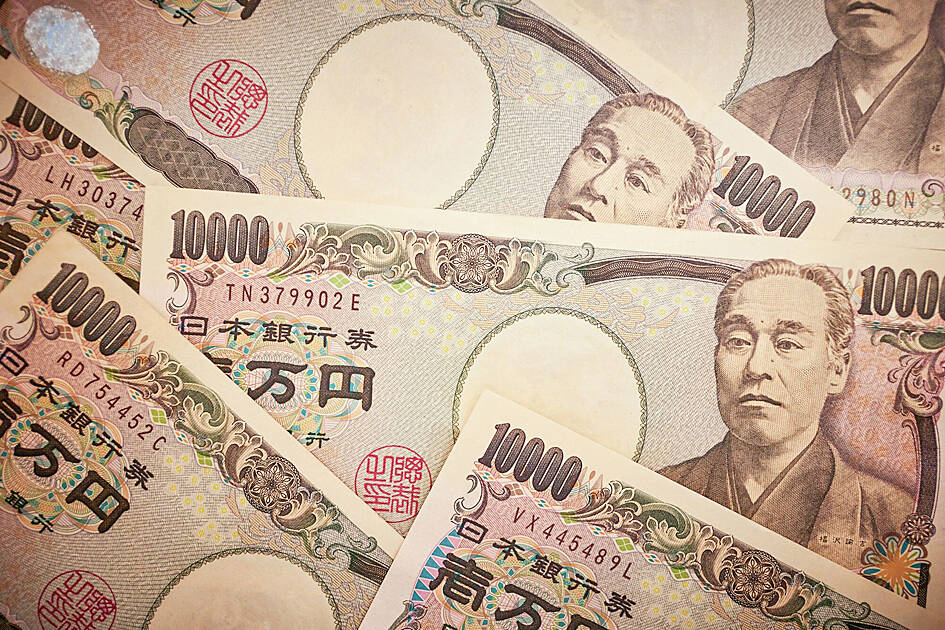Germany is projected to dislodge Japan as the world’s third-largest economy this year, helped by a slide in the yen against the US dollar and the euro.
The IMF’s latest projections estimate Germany’s nominal GDP at US$4.43 trillion this year, compared with US$4.23 trillion for Japan.
The projections came as the yen teeters close to ¥160 against the euro and remains within striking distance of the 33-year low against the US dollar that sparked a second round of currency intervention in October last year. The euro last reached ¥160 in August 2008.

Photo: Bloomberg
The yen weakness has largely been caused by fundamental differences in monetary policy. The US Federal Reserve and the European Central Bank (ECB) have raised interest rates from COVID-19 pandemic lows to tackle inflation, while the Bank of Japan has stayed in stimulus mode as it looks to nurture price growth after years of deflation.
While the Fed and ECB are expected to keep rates unchanged at their upcoming meetings, expectations that borrowing costs would stay higher for longer are likely to maintain pressure on the yen.
The Bank of Japan meets next week amid speculation of possible tweak to its control of bond yields, but the ending of its negative interest rate is not widely expected to come until next year.
Still, the figures also point to steadier long-term growth in Germany that would concern policymakers in Japan as they mull the details of their latest economic package.
“It’s true that Japan’s growth potential has fallen behind and remains sluggish,” Japanese Minister of Economy, Trade and Industry Yasutoshi Nishimura said yesterday when asked about the IMF projections. “We’d like to regain the ground lost over the past 20 or 30 years. We want to achieve that through measures such as our upcoming package.”
Japanese Prime Minister Fumio Kishida on Monday said that the economic stimulus package includes an extension of energy subsidies, a measure aimed at helping ease the cost-of-living crunch caused by Japan’s strongest inflation in decades.
He said there would also be steps to ensure upward momentum in wages stays in place along with some form of tax reduction.
The IMF figures show that Germans are likely feeling a lot better off than Japanese, too. Average GDP per person in Germany is projected at US$52,824, compared with US$33,950 in Japan.

Nvidia Corp’s demand for advanced packaging from Taiwan Semiconductor Manufacturing Co (TSMC, 台積電) remains strong though the kind of technology it needs is changing, Nvidia CEO Jensen Huang (黃仁勳) said yesterday, after he was asked whether the company was cutting orders. Nvidia’s most advanced artificial intelligence (AI) chip, Blackwell, consists of multiple chips glued together using a complex chip-on-wafer-on-substrate (CoWoS) advanced packaging technology offered by TSMC, Nvidia’s main contract chipmaker. “As we move into Blackwell, we will use largely CoWoS-L. Of course, we’re still manufacturing Hopper, and Hopper will use CowoS-S. We will also transition the CoWoS-S capacity to CoWos-L,” Huang said

Nvidia Corp CEO Jensen Huang (黃仁勳) is expected to miss the inauguration of US president-elect Donald Trump on Monday, bucking a trend among high-profile US technology leaders. Huang is visiting East Asia this week, as he typically does around the time of the Lunar New Year, a person familiar with the situation said. He has never previously attended a US presidential inauguration, said the person, who asked not to be identified, because the plans have not been announced. That makes Nvidia an exception among the most valuable technology companies, most of which are sending cofounders or CEOs to the event. That includes

INDUSTRY LEADER: TSMC aims to continue outperforming the industry’s growth and makes 2025 another strong growth year, chairman and CEO C.C. Wei says Taiwan Semiconductor Manufacturing Co (TSMC, 台積電), a major chip supplier to Nvidia Corp and Apple Inc, yesterday said it aims to grow revenue by about 25 percent this year, driven by robust demand for artificial intelligence (AI) chips. That means TSMC would continue to outpace the foundry industry’s 10 percent annual growth this year based on the chipmaker’s estimate. The chipmaker expects revenue from AI-related chips to double this year, extending a three-fold increase last year. The growth would quicken over the next five years at a compound annual growth rate of 45 percent, fueled by strong demand for the high-performance computing

TARIFF TRADE-OFF: Machinery exports to China dropped after Beijing ended its tariff reductions in June, while potential new tariffs fueled ‘front-loaded’ orders to the US The nation’s machinery exports to the US amounted to US$7.19 billion last year, surpassing the US$6.86 billion to China to become the largest export destination for the local machinery industry, the Taiwan Association of Machinery Industry (TAMI, 台灣機械公會) said in a report on Jan. 10. It came as some manufacturers brought forward or “front-loaded” US-bound shipments as required by customers ahead of potential tariffs imposed by the new US administration, the association said. During his campaign, US president-elect Donald Trump threatened tariffs of as high as 60 percent on Chinese goods and 10 percent to 20 percent on imports from other countries.